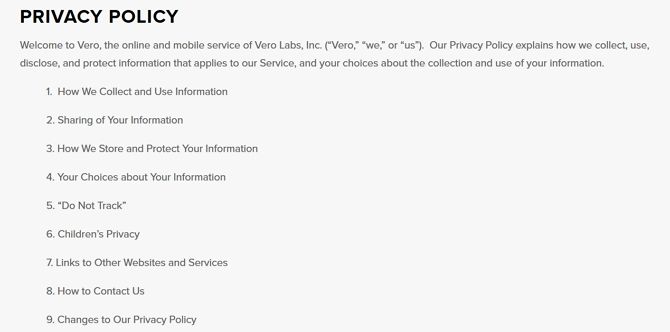New social network Vero takes its name from the Latin for "truth" and has positioned itself as a privacy-focused social network.
But press releases and marketing show us only what the company wants us to see. We were curious: what's really behind the hype?
Vero's Privacy Policy
In February 2018, the social media "upstart" Vero saw a surprise and very sudden untick in new users. In the crowded world of social networking, Vero hopes to stand out by offering an ad-free social network for everyone.
Like many prior social media upstarts, they aim to build a "true social" platform with heavy emphasis on the "social".
A company's Privacy Policy and Terms of Service are the two most important documents you need to read. They inform you how the company operates, collects and uses data, and what you can do about it. They are long, jargon-laced documents---likely intentional---but are essential reading before handing over your personal data.
Vero's Privacy Policy offers no surprises. They use cookies, store your data in multiple countries, and will share your data internally and with their service providers. In keeping with their ad-free stance, there is no mention of data sharing arrangements with advertisers.
While all of this seems reasonable on the surface, in late February 2018, the company came under criticism for the way it phrased certain segments of its Terms of Service. The terms appeared to imply that Vero would own any content you posted to their app. They quickly verified that this wasn't the case and amended the wording. However, Vero isn't the first company to have fallen into this trap.
In 2012, Instagram upset many users when they updated their Terms of Service and implied they owned your content. As it happens, both services currently have the same approach to user content: you own your content, but the company is able to license it.
The Russians Are Coming
There seems to be nothing these days that isn't in some way touched by allegations of Russian meddling. The Russians have been implicated in everything from Brexit, to the 2018 Winter Olympics, and the 2016 US Presidential Election.
Unfortunately Vero doesn't seem to have evaded allegations of Russian influence either. As noted by Pasquale De'Silva on Twitter, most of Vero's development team appear to be Russian:
While this has been spun as yet another example of Vladimir Putin's attempt to undermine the Western world, it could simply be that they were talented developers suitable for the job. There have also been claims that Vero's CEO Ayman Hariri---or more specifically his brother (and Prime Minister of Lebanon), Saad Hariri---has ties to Putin.
The allegations revolve around a meeting between Saad Hariri and Putin in late 2017. It could be part of a large Russian conspiracy... or it could just be evidence of two world leaders meeting as world leaders tend to do.
Courting Controversy
Not long after Vero exploded into the mainstream, its CEO was linked to unethical behavior at his former company.
Ayman Hariri was previously the CEO of the construction company Saudi Oger. In 2015, Saudi Oger found itself in financial difficulty, which resulted in the company's migrant workers stranded in Saudi, homeless, unpaid, and without food.
Vero found itself at the sharp end of a backlash after it was uncovered that Hariri had served as the company's CEO.
However, in documents disclosed to Mashable, Vero proved that Hariri divested himself in 2014, before the company found itself in financial trouble. The complication is that, as late as 2016, Vero still referred to Hariri as the CEO of Saudi Oger in press releases.
It's unclear why they chose to do this, aside from Hariri's claim that he was proud of the company that his father set up. Whether you view this as a deal breaker for Vero will be down to your personal beliefs. However, it does somewhat taint the company as it positions itself in the moral highground.
Behind Vero's Success and Future
Despite the sudden interest in Vero, the fledgling social network has been around since 2015. There's no clear reason for the explosive curiosity in Vero, but dissatisfaction with current market leaders may have something to do with it.
Despite that, it is unusual for an app to see such rapid growth after three years on the market. Vero spent its first few years courting celebrities and creators. This was a diverse group of people including Grammy-nominated music producer StarRo, GQ magazine, and, bizarrely, British political commentator Andrew Neil.
According to Forbes, Vero's CEO Ayman Hariri was worth $1.3 billion as of February 2018. While many people may find the idea of a "startup" created by a billionaire hard to stomach, it may be this mighty financial backing that has allowed Vero to get off the ground.
Unlike almost the entire internet, Vero is not ad-supported. Instead, the company aims to make money from subscriptions.
Initially Vero offered a lifetime subscription free to the first million users. However, at the time of writing, this offer has been extended indefinitely. Unsurprisingly this has lead to doubts over how likely the business model is to succeed.
Out With the Old, In With More of the Same
Although it seems Vero is already on the turn from their status as social media saviors, there's a lot to be said for their approach.
From the allegations against Vero's CEO to the backlash against their Terms of Service, Vero has swiftly felt a knock to its reputation. It may not be the grassroots upstart you think it is, but Vero is focused on user-privacy.
The subscription model does away with the need for intensive data collection---a trait that has been the hallmark of social media for over a decade. Currently, Vero stands as an impressive challenger to the dominance of the old social networks. If it can avoid any further scandals, then it may realise its potential as a "true social" network.


